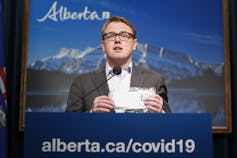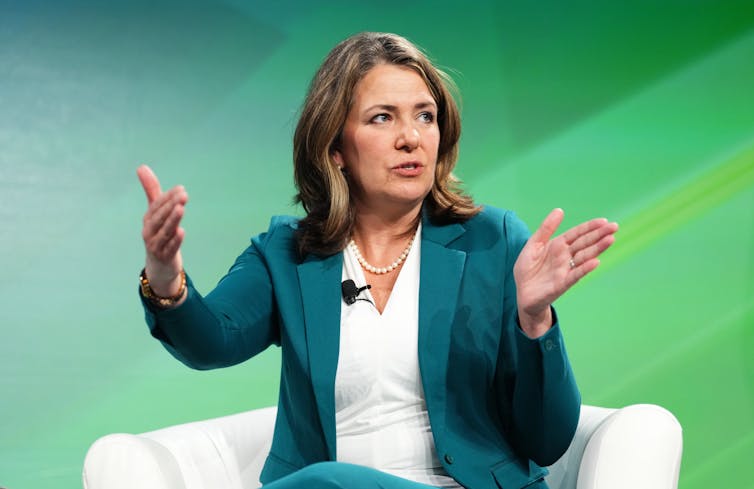
During typical election campaigns, reasonable people can disagree about whether a government is competent, its policies are effective or its priorities are in step with society.
In Alberta, the United Conservative Party (UCP) government’s actions over the past four years have made it clear: the ongoing provincial election campaign is far from typical. It’s about something more fundamental.
Throughout its time in office, the UCP has shown disregard for the separation of powers and the rule of law. With the writ about to be officially dropped for the May 29 election, that means the vote is not just about right versus left or conservative versus progressive.
It’s about whether Albertans want to place their trust in democratic institutions or continue to erode the safeguards that protect us from arbitrary abuses of power. Any policy debates are moot without settling that question.
How did the UCP put Albertans in this position?
Sweeping powers
For one, the party has repeatedly attempted to seize power from independent bodies and other branches of government, often successfully.

In the opening months of the COVID-19 pandemic, the UCP handed sweeping legislative powers to the health minister, removing the ability of members of the legislature to review changes to laws and regulations.
Only when faced with legal threats and public backlash from allies — but against the wishes of his own caucus — did former premier Jason Kenney relent and return the authority to the legislative branch.
The UCP has also removed the boards and heads of numerous arms-length agencies. This included replacing the entire Alberta Health Services Board with a single commissioner.
These patronage appointments were meant to centralize control within the UCP government over health care, post-secondary education and other sectors.
The Sovereignty Act had the same intent. The original version would have stolen powers from the federal government, the Alberta legislature and the courts and granted them to the premier.
Once again, the government had to be shamed into amending the bill, making Alberta a national and international laughing stock. And once again, the UCP’s anti-democratic impulses were laid bare.
A series of misdeeds
More fundamentally, the UCP has demonstrated a passing fancy for the rule of law. Since coming to power four years ago, there have been several examples:
The firing of the election commissioner before he could complete his investigation into Kenney’s leadership campaign;
The then-health minister confronted a neighbour in his own driveway about the doctor’s critical social media post about him;
The then-attorney general called up a police chief to discuss his traffic ticket;
Premier Danielle Smith’s refusal to call a byelection despite the legal requirement to do so;
Smith’s stated wish that she could provide “political solutions” to criminal prosecutions of her supporters, denigrating the courts as legitimate checks on their authority;
Smith’s threat to sue a major media outlet in an effort to avoid questions.
One thing is clear. Mired in multiple ongoing investigations into prosecutorial interference, professional misconduct and the party’s inaugural leadership race, the UCP’s actions indicate it considers itself above the law and beyond reproach.
The sheer volume of misdeeds is shocking and Albertans shouldn’t be lulled into thinking that it’s politics as usual. Just because many of these episodes happened in plain sight, in front of cameras and microphones, that doesn’t make them any less egregious.

Consolidation of power
As much as outsiders attribute these episodes to Alberta’s “Wild West” culture, the UCP’s anti-democratic approach to governing is not a matter of right-wing political norms.
It’s about consolidating power into the hands of the Premier’s Office by taking over mechanisms of oversight and control, removing checks and balances altogether and pretending that the rules do not apply to the UCP and its followers. This is a feature of UCP, not a bug. Conservatives usually stand against those sorts of things.
Read more: How Danielle Smith won in Alberta and what it means for Canada
Indeed, not too long ago, Albertans could count on their elected government officials to put a stop to these anti-democratic activities. Those days are behind us, but the election is not.
Normal political campaigns usually feature rousing debates over leadership, priorities, policies and ideas. Voters choose between different governing agendas, not entirely different systems of government. Those days, too, are behind us.
The UCP’s record in office now means that a vote for that party is about far more than endorsing a policy platform or conservatism — it’s about choosing party over province. People contemplating casting their ballot for the UCP should understand precisely what that means.
Albertans deserve better. But they’ll need to demand it. That’s what democracy requires of us from time to time.
Jared Wesley receives funding from the Social Sciences and Humanities Research Council (SSHRC) of Canada, the Killam Trust, and the Kule Institute for Advanced Study. From 2011 to 2017, he served in various senior management roles with the Government of Alberta. His full disclosure statement is found here: https://jaredwesley.ca/disclosure.
This article was originally published on The Conversation. Read the original article.







